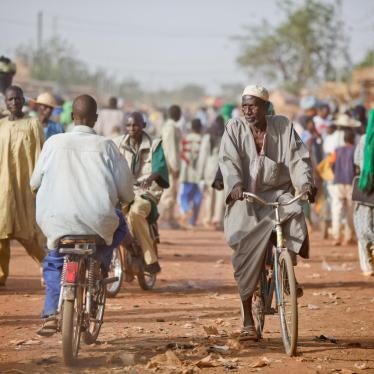Before he was arrested last year in Uganda on terrorism charges, Al Amin Kimathi was hailed as an outspoken activist who challenged East African governments to conduct lawful counterterrorism operations.
The Kenyan human rights defender had gone to Uganda to advocate for the rights of those detained in connection with the bombings; only to be told later that he was himself a suspect. Without a shred of evidence of his alleged involvement in the July 2010 Kampala bombings, he was charged with terrorism, sent to Uganda’s maximum-security prison, Luzira, and detained for nearly a year.
His recent release is cause for celebration. And so is his return into the fraternity of human rights advocates who had pushed international and national actors to see errors in the investigation. We all felt Kimathi was finally vindicated. But the ordeal he was forced to endure is a real eye-opener. It is also a bitter reminder of the excesses that continue to cloud regional efforts at what is generally referred to as the “global war on terror.”
As a human rights defender, Kimathi may have noted every single instance when his rights were violated. His mission to Uganda, on September 15, 2010 -- the day he was apprehended at Entebbe Airport -- was in fact aimed at ensuring that already-detained suspects benefitted from fundamental legal protections that any accused person enjoys in law-abiding nations, such as the right to a lawyer and to be presumed innocent until proven guilty.
Sadly, Uganda failed to observe these protections early on, to the detriment of Kimathi and those detained with him. As Kimathi made it clear after his release, his ordeal included being held incommunicado, being denied information on the reasons for his arrest, being blindfolded, and other demeaning practices. And the last thing he could have ever anticipated was to languish in prison for twelve months without the presentation of any evidence of wrong-doing.
It is still an open question whether, and if so how, Kimathi’s arrest and detention were calculated to silence a critical voice that moved quickly to shame the governments of Uganda and Kenya for crossing the line in their counterterrorism approaches.
But there is no doubting the ultimate result of Uganda’s actions against Kimathi: the activist was silenced for a year, indeed at the expense of those he labored to defend. The actions also had a chilling effect on other civil society members with an interest in probing human rights abuses triggered by Uganda’s response to the Kampala attacks. Fortunately, Kimathi’s release is an indication that Ugandan authorities were ultimately unable to silence the truth.
But Uganda had tried hard to do so. In April 2011, four Kenyan activists were denied entry into Uganda, where they were to meet with a judicial official concerning Kimathi’s case; one of them, Samwel Mohochi, has filed a suit before the East African Court of Justice, charging Uganda with violating the guarantees of free movement and non-discrimination found within the treaty establishing the East African Community.
Uganda is not the only regional government pushing counterterrorism efforts way too far. In other cases, eastern African countries have used the specter of terrorism to restrict rights and repress freedom of expression. In May, Kenya expelled human rights activist Clara Gutteridge, a fellow with the Open Society Justice Initiative. Kenyan Immigration Minister Otieno Kajwang told Parliament that Gutteridge, a British citizen, was “involved in subversive activities which were a threat to national security,” and “involv[ed] with known terrorist operatives and al-Shabaab.” Kajwang further said Gutteridge was “found in possession of materials related to al-Shabaab,” and falsely claimed she was traveling on two passports. Gutteridge’s alleged “subversive activities” seemed to consist of her investigations of abuses committed by eastern African governments in the context of counterterrorism operations. The documents found on Gutteridge consisted of legal briefs related to the arbitrary detention and rendition of several terror suspects.
In Ethiopia, terrorism charges are also used to silence critics and restrict freedom of expression and due process rights. At least four journalists were charged under the country’s restrictive anti-terrorism law in separate cases on September 6, 2011 after several months of remand detention.Ethiopia’s Anti-Terrorism Proclamation contains an overbroad and vague definition of terrorist acts and makes the publication of statements “likely to be understood as encouraging terrorist acts” punishable by imprisonment for 10 to 20 years. The government is exploiting the law’s overly broad language to accuse peaceful critics, journalists, and political opponents of encouraging terrorism. Under this law, suspects can be held in custody for up to four months without charge. This is contrary to the Ethiopian constitution, which provides that suspects in detention should be charged or released within 48 hours, and violates international due process standards.
East Africa’s robust participation in global anti-terrorism campaigns is not in itself a problem. No one would deny that terrorism is a real threat in the region. The attacks on American embassies in Nairobi and Dar Es Salaam in 1998 and the more recent bombings in Kampala are telltale signs that warrant strict legally acceptable measures to curb terrorist activities in East Africa. The presence in the region of radical insurgent groups, some of which resort to terrorist methods, only adds fuel to the fire.
But no threat will ever excuse the hi-jacking of anti-terrorism campaigns through the use of ambiguous legislation or law enforcement mechanisms that purposefully seek to intimidate or silence critics. It is time we keep a closer eye on how our governments frame their participation in the global war on terror. Once governments stop brandishing the terror threat to abuse the rights of citizens, Kimathi will finally be fully vindicated.





